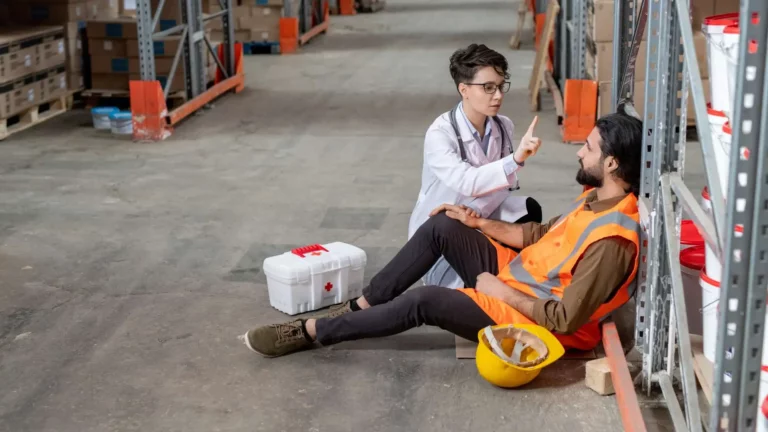Table of Contents
Introduction
Injuries at the workplace can affect one’s health and income. As a result, employees need to understand how settlements affect health insurance, recovery, and finances.
In 2022, private employers reported over 2.8 million nonfatal injuries and illnesses, per the Bureau of Labor Statistics. Injuries can include mild sprains and strains, broken limbs, fractures, and even traumatic brain injuries. Does health insurance cover work-related injuries after settlement? This blog post addresses this contentious topic and clarifies your rights and options.
Importance of Coverage for Work-Related Injuries
Work injuries can occur in many forms, from severe conditions to minor strains. Depending on the severity of the injury, the medical treatment costs of either case will not be less. Health insurance is extremely important in reducing those costs after a settlement has been agreed upon.
After the initial payments have been exhausted, this can assist with any further current medical expenses, therapy, drugs, and other necessary forms of treatment.
Read Related Article: Top 10 Financial Tips for Caregivers and Childcare Workers
Overview of Health Insurance and Settlements
Health insurance covers many services. Yet, coverage for work-related injuries has limits. These limits depend on the injury type, coverage type, and state laws. So, consider these factors to use your health insurance benefits well.
When Does Insurance Cover Work-Related Injuries Post-Settlement?
Your medical insurance might cover the work injury costs, even after a settlement.
Conditions for Coverage
Health insurance coverage for work-related injuries after a settlement varies. However, it usually requires the treatment to be medically necessary. This means the insurance will only pay for treatment needed to heal, maintain, or manage the injury.
Types of Injuries Typically Covered
Health insurance covers many injuries, but specifics vary by plan. Common work-related injuries typically covered include:
- Sprains.
- Strains.
- Fractures.
- Cuts.
Factors Affecting Post-Settlement Coverage
Coverage after the settlement is determined by several factors, such as:
Policy Provisions and Exclusions
Before a settlement, your health insurance may have specific rules about work-related injuries. It could include exclusions or clauses that define which plan pays first and which one pays later.
State Laws and Regulations
Health insurance coverage for work injuries depends on state laws. Some states require work injuries to remain covered even after a settlement. So, it’s vital to research your state’s rules.

Typical Costs of Work-Related Injuries
A work-related injury’s average cost depends on its severity, treatment needed, and recovery time. Here’s a breakdown of these potential costs:
Average Costs with Insurance
When insurance is covered, the cost of treatment provided using average medical care, such as doctor appointments, surgeries, and physical rehabilitation, is greatly reduced. For instance, a medical procedure such as surgery that may have cost $20,000 would be cut to a few thousand out of patients’ pockets, depending on the policy deductibles and co-payments.
Out-of-Pocket Expenses
Health insurance likely won’t cover work-related injuries fully. So, you might have to pay out of pocket. These costs can add up and strain your finances. Therefore, it’s wise to estimate these expenses and plan. Consider using health savings accounts (HSAs).
How to Verify Your Coverage
Here are some steps to take to verify your coverage for work-related injuries after a settlement:
Checking Your Insurance Policy
To see if you’re covered for work injuries after your settlement, examine your health insurance policy. Check for coverage on work-related injuries, coordination of benefits, and any exclusions.
Read Related Article: Emergency Cash Solutions for Low-Income Workers
Contacting Your Insurance Provider
If you have questions about coverage, contact your insurer directly. They will provide all the details and options available to you.
Steps to Get Post-Settlement Injuries Approved
After the above procedures, consider these steps.
Pre-authorization requirements
Some health insurance plans require pre-approval for certain workplace injury treatments. Call your insurer to check if you need it. Be ready to share your medical records and your doctor’s reasons for the treatment.
Claim filing process
To get benefits for injury claims after settlement, keep all necessary documents. Then, endorse them promptly. Also, claimants should expect feedback from the insurance company, depending on processing time.
Tips for Managing Work-Related Injury Costs
Here are some suggestions to help limit the out-of-pocket expenses relating to such treatment:
Using In-Network Providers
To cut costs from a work injury, use in-network providers. They’ve secured discounts with your insurer, lowering your expenses. So, check your plan for nearby in-network providers.
Exploring Financial Assistance Options
You can get financial help for work-related injuries. Options include workers’ compensation and insurance. Also, Beem, through its Everdraft™ feature, offers emergency funds, allowing users to withdraw up to $1,000. There are no credit checks, no interest, no income restrictions, no due dates & no tips. Meet your emergency expenses with Beem’s Everdraft and experience peace of mind.
Read Related Article: Top 10 Financial Tips for American Workers: How to Handle Emergency Bills
Conclusion
Health insurance for work-related injuries varies by policy and provider. Many plans cover medical costs from work accidents. However, individuals should check their policy for limits, exclusions, deductibles, and copays.
Knowing coverage and costs helps people make better decisions. The insurance marketplace Beem lets you compare health plans from various companies at lower costs. Users can review coverage for preventive, basic, and comprehensive care. Choose from a variety of plans so you can find coverage that fits your lifestyle and budget. Download the app here.
FAQs for Does Health Insurance Cover Work-Related Injuries After Settlement
What should I do if my insurance doesn’t cover the full cost of work-related injuries?
If your insurance doesn’t cover all work injuries, explore other options. Consider workers’ compensation, disability benefits, or doctor payment plans.
Are work-related injuries covered by health insurance after a settlement?
After a settlement, coverage for work-related injuries varies by health plan and state laws. Some plans may continue covering medical expenses, while others might limit or exclude coverage.
How can I find out if my insurance covers specific work-related injury treatments?
If your insurance covers specific work injury treatments or therapies, check your health insurance policy documents or call your insurance provider directly. They will be able to provide you with detailed information that covers their policies and any limitations that may apply.















































